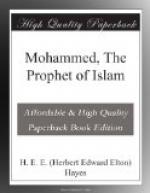“The tendency to glorify Mohammed and the reciters of the traditions was considerably modified by the mortal strife which characterised the factions that opposed one another at the period, where, in attempting to depreciate one another, they would not be averse to perpetuating traditions in support of their contentions; such partisanship secured no insignificant body of historical fact, which otherwise would have been lost.”
He also points out that in a state of society circumscribed and dwarfed by the powerful Islamic system, which proscribed the free exercise of thought and discussion, tradition can scarcely be said to be the “vox populi.” The growth and development of tradition, the flagrant distortion of historical fact, the ethical code of Islam, may well give rise to a questioning of the validity of the prophet’s arrogant claims, and by their very methods of defence the apologists of Islam exhibit its weakness and inadequacy to meet the religious needs of man. The natural bias of Mohammed is evident throughout the Coran. His conceptions of God, of the future life, and of the duty of man, are all influenced by his consuming master passion. In all his writings there are lacking those characteristics which distinguish the true prophet—the messenger of God—from those to whom he is sent. This will be apparent by contrasting his views with those of any of the Old Testament prophets. They were eminently men prepared for their high calling by lofty yet practical communion with God—men whose message was inspired by a vision of Divine Majesty, and an impressive conception of the justice and awful purity of Jehovah. Men who called the nation to righteousness of life by a stirring appeal to conscience, and an unfaltering denunciation of the evils of the time. Their spiritual aspirations, therefore, by far surpass the loftiest ideals of the prophet of Islam, while their ethical conceptions infinitely transcend all that Mohammed dreamed of. The voice of the Eternal is clearly heard in the earnest utterances that fell from their lips, and through all their prophecies the willingness of Divine Mercy to reason with men in spite of their erring ways, is apparent.
Three characteristic elements are perceived in their preaching—a very keen and practical conscience of sin; an overpowering vision of God; and a very sharp perception of the politics of their day. Of these elements, Mohammed’s teaching possesses only the last.
MOHAMMED’S CONCEPTION OF GOD
His conception of God is essentially deistical. The intimate personal communion, so characteristic of the Old Testament, is unknown and unrealised: hence there is little, if anything, in his system that tends to draw men nigh to God. Attempts to remedy this characteristic defect have been vainly made by the dervish orders, which, while acknowledging the claims of Mohammed and his book, have introduced methods




